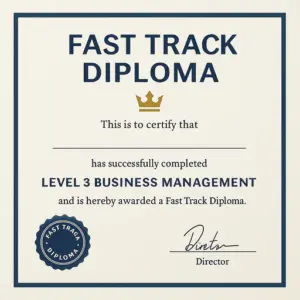
FAST TRACK DIPLOMA – LEVEL 3 – LOGISTICS AND SUPPLY CHAIN MANAGEMENT
FAST TRACK DIPLOMA – LEVEL 3 – LOGISTICS AND SUPPLY CHAIN MANAGEMENT
Provider: Fast Track Diploma — 100% online for Nigerian students
Summary
Diploma in Logistics & Supply Chain Management — a practical, career-focused online qualification designed for learners in Nigeria who want to enter logistics, warehousing, procurement, transport operations or supply chain roles. This fully online diploma covers operations, inventory control, procurement, distribution, and basic supply chain planning — with Nigerian-relevant examples and career support.
Mode: 100% online — study from anywhere in Nigeria Duration: Fast-track options from 12–24 weeks (self-paced routes available) Assessment: Assignments, case studies, simulated operational tasks and a final synoptic project Qualification level: Regulated vocational diploma (Level 3 equivalent)
Why this course suits Nigerian students
Fully online delivery removes relocation costs — study from Lagos, Port Harcourt, Kano, or any Nigerian city with internet access.
Course content includes examples from Nigerian ports, road transport networks, local warehousing and last‑mile distribution challenges.
Practical guidance on local customs, import/export basics, documentation and compliance relevant to Nigerian traders and SMEs.
Low-bandwidth options, downloadable templates and timings scheduled for Nigerian time zones.
Career-focused skills for fast entry into logistics roles or to support small businesses with supply chain needs.


Entry requirements (Nigerian applicants)
Typical entry: 5 SSCE/WASSCE/NECO passes including English and Maths, or equivalent
Mature applicants with relevant workplace experience may be considered
Required: internet access, a laptop/tablet for coursework and basic spreadsheet skills
Study structure & learner support
Flexible study routes: fast-track (12–24 weeks) or part-time self-paced options
Learning resources: video lessons, downloadable process templates, checklist and Nigerian case studies
Practical simulations: scenario-based tasks that mirror warehouse, procurement and transport activities
Tutor support: personalised feedback, forums and scheduled webinars at Nigerian‑friendly times
Career services: CV help, interview prep and links to local logistics employers where available

Learning outcomes
On successful completion you will be able to:
Explain core logistics and supply chain concepts within a Nigerian context
Maintain simple inventory systems and use reorder calculations to avoid stockouts
Support procurement activities and manage supplier relationships for small businesses
Apply basic warehousing and distribution practices to improve operational efficiency
Understand import/export documentation essentials and compliance basics
Use spreadsheets and basic digital tools to plan and document supply chain activities
Assessment & certification
Assessment methods: tutor-marked assignments, practical case studies, simulation tasks and a final synoptic project.
Award: Diploma in Logistics & Supply Chain Management from Fast Track Diploma.
Certification: digital certificate and transcript provided on successful completion; portfolio evidence suitable for employers.

Who this course is for
SSCE/WASSCE/NECO graduates seeking practical logistics and supply chain skills
Warehouse operatives, drivers, procurement clerks and admin staff wanting progression
Small business owners and entrepreneurs handling stock, procurement or distribution
Career changers aiming for operational, procurement or transport coordination roles
What you’ll learn (core modules)
Introduction to Logistics & Supply Chain — key concepts, roles and the Nigerian supply chain landscape
Inventory Management & Stock Control — stock recording, reorder points, safety stock and simple forecasting
Procurement & Supplier Management — procurement cycles, supplier selection, basic negotiation and contract essentials
Warehousing Operations — receiving, storage systems, picking, packing and warehouse safety
Transport & Distribution Basics — route planning, carrier selection, documentation and last‑mile considerations in Nigeria
Import/Export & Customs Fundamentals — paperwork, INCOTERMS basics and compliance for cross‑border trade (introductory)
Supply Chain Technology & Recordkeeping — digital tools, inventory software basics and spreadsheet modelling for operations
Sustainable & Ethical Supply Chains — environmental impact, community considerations and responsible procurement
Health & Safety in Logistics — workplace safety, manual handling and secure cargo practices
Final Synoptic Project — integrated task: design a simple end‑to‑end supply chain/operation for a Nigerian SME

Career Outcomes & Progression
Career outcomes & progression Typical roles graduates may pursue: Logistics Coordinator / Assistant Warehouse Operative / Supervisor Procurement Assistant Transport / Fleet Coordinator Inventory Control Clerk Progression options: Further study (HND, supply chain diplomas) or professional qualifications in procurement and logistics Specialisation in freight forwarding, customs brokerage, or supply chain planning

Fees & payment (Nigeria)
Fees & payment (Nigeria) Competitive fees with instalment plans and employer/group discounts available. Contact Student Services for current NGN pricing, local payment channels (bank transfer, card, mobile money where supported) and employer-sponsored options. Frequently asked questions (FAQ) Do I need prior experience in logistics? No — the course starts with fundamentals and builds practical skills, though workplace experience helps. Will I get practical experience? The qualification includes simulation tasks and practical templates; we support learners to arrange brief local workplace observations where possible. Is this recognised in Nigeria? The diploma is an internationally-recognised vocational qualification aimed at employment and further study—confirm specific employer or regulatory requirements for specialised roles.

Frequently asked questions (FAQ)
Frequently asked questions (FAQ) Do I need prior accounting experience? No — the course starts with fundamentals and builds up to more advanced topics. How is the course assessed? Through assignments, practical tasks and a synoptic final project that mirrors real-world workplace tasks. Will I receive a certificate? Yes — a Level 3 Diploma certificate is awarded on successful completion. Can I study while working? Yes — the course is designed for flexibility; many learners study evenings and weekends. Get started / Contact us Ready to fast-track your accounting career? Contact Fast Track Diploma Student Services: Email: info@fasttrackdiploma.com Apply: Visit the Fast Track Diploma application Contact Page
FAST TRACK DIPLOMA SUPPORTS ALL STUDENTS IN NIGERIA AND ITS TOWNS AND CITIES
| Lagos | Oyo | Ilesa | Ila |
|---|---|---|---|
| Kano | Sokoto | Gombe | Shaki |
| Ibadan | Owerri | Obafemi Owode | Ijero |
| Benin City | Yola | Owo | Ikot Ekpene |
| Port Harcourt | Calabar | Suleja | Jalingo |
| Aba | Umuahia | Lavun | Otukpo |
| Jos | Ondo | Potiskum | Okigwe |
| Ilorin | Minna | Kukawa | Kisi |
| Abuja | Lafia | Gusau | Buguma |
| Kaduna | Okene | Iwo | Funtua |
| Enugu | Katsina | Bida | Abakaliki |
| Zaria | Ikeja | Ugep | Asaba |
| Ogbomosho | Nsukka | Ijebu Ode | Gbongan |
| Warri | Ado Ekiti | Epe | Igboho |
| Ikorodu | Awka | Ise Ekiti | Gashua |
| Maiduguri | Iseyin | Gboko | Bama |
| Ife | Mubi | Ilawe Ekiti | Uromi |
| Bauchi | Onitsha | Ikare | |
| Akure | Sagamu | Osogbo | |
| Abeokuta | Makurdi | Okpoko | |
| Uyo | Mokwa | Garki | |
| Badagry | Sapele |






